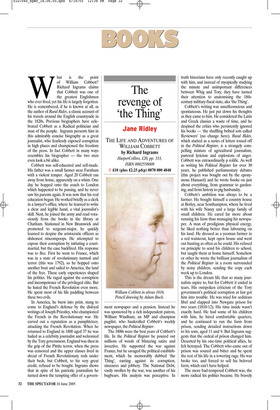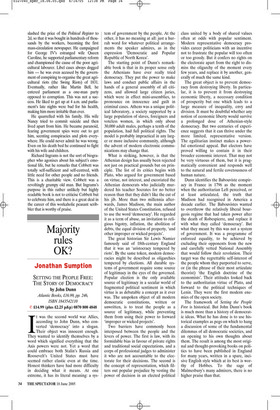The revenge of ‘the Thing’
Jane Ridley
THE LIFE AND ADVENTURES OF WILLIAM COBBETT by Richard Ingrams HarperCollins, £20, pp. 333, ISBN 0002558009 ✆ £18 (plus £2.25 p&p) 0870 800 4848 What is the point of William Cobbett? Richard Ingrams claims that Cobbett was one of the greatest Englishmen who ever lived, yet his life is largely forgotten. He is remembered, if he is known at all, as the author of Rural Rides, a classic account of his travels around the English countryside in the 1820s. Previous biographers have celebrated Cobbett as a Radical politician and man of the people. Ingrams presents him in this admirably concise biography as a great journalist, who fearlessly exposed corruption in high places and championed the freedom of the press. In fact Cobbett in many ways resembles his biographer — the two men even look a bit alike.
Cobbett was self-educated and self-made. His father was a small farmer near Farnham with a violent temper. Aged 20 Cobbett ran away from home, apparently on a whim. One day he hopped onto the coach to London which happened to be passing, and he never saw his parents again. It was now that his real education began. He worked briefly as a clerk in a lawyer’s office, where he learned to write a clear and legible hand, a vital journalist’s skill. Next, he joined the army and read voraciously from the books in the library at Chatham. Stationed in New Brunswick and promoted to sergeant-major, he quickly learned to despise the aristocratic officers as dishonest nincompoops. He attempted to expose their corruption by initiating a courtmartial, but the case backfired. His response was to flee. First he went to France, which was in a state of revolutionary turmoil and terror (this was 1792), so he hopped onto another boat and sailed to America, the land of the free. These early experiences shaped his politics. He raged against the corruption and incompetence of the privileged elite. But he hated the French Revolution even more. He spent most of his life paddling between these two evils.
In America, he burst into print, stung to come to England’s defence by the disloyal writings of Joseph Priestley, who championed the French in the Revolutionary war. He carved out a reputation as a pamphleteer, attacking the French Revolution. When he returned to England in 1800 aged 37 he was hailed as a celebrity journalist and welcomed by the Tory government. England was then in the grip of the Pittite terror, when the press was censored and the upper classes lived in dread of French Revolutionary reds under their beds, but Cobbett, to his very great credit, refused to be bought. Ingrams shows that in spite of his patriotic journalism he turned down the tempting offer of a govern ment newspaper and a pension. Instead he was sponsored by a rich independent patron, William Windham, an MP and champion pugilist, who bankrolled Cobbett’s weekly newspaper, the Political Register.
The 1800s were the best years of Cobbett’s life. In the Political Register he poured out millions of words of blistering satire and invective. He supported the war against France, but he savaged the political establishment, which he memorably dubbed ‘the Thing’, ranting against its corruption, sinecures and jobbery. The National Debt, vastly swollen by the war, was another of his bugbears. His analysis was perceptive. In truth historians have only recently caught up with him, and instead of myopically studying the minute and unimportant differences between Whig and Tory, they have turned their attention to anatomising the 18thcentury military-fiscal state, aka ‘the Thing’.
Cobbett’s writing was unselfconscious and spontaneous. He just put down his thoughts as they came to him. He considered the Latin and Greek classics a waste of time, and he despised the critics who persistently ignored his books — ‘the shuffling bribed sots called Reviewers’ (no change here). Rural Rides, which started as a series of letters tossed off in the Political Register, is a strangely compelling mixture of agricultural journalism, pastoral lyricism and explosions of anger. Cobbett was extraordinarily p rolific. As well as writing his Political Register for over 30 years, he published parliamentary debates (this project was bought out by the eponymous Hansard) and he wrote books on just about everything, from grammar to gardening, and from history to pig husbandry.
Cobbett’s ambition was always to be a farmer. He bought himself a country house at Botley, near Southampton, where he lived with his wife Nancy and a large family of small children. He cared far more about running his farm than managing his newspaper. A man of prodigious physical energy, he liked nothing better than labouring on his land. He dressed as a yeoman farmer in a red waistcoat, kept open house and went out hunting as often as he could. His refused on principle to send his children to school, but taught them at home himself. Somehow or other he wrote the brilliant journalism of the Political Register in a room surrounded by noisy children, sending the copy each week up to London.
This is the dream life that so many journalists aspire to, but for Cobbett it ended in tears. His outspoken criticism of the Tory government’s political corruption at last got him into trouble. He was tried for seditious libel and clapped into Newgate prison for two years (1810-12). His time inside wasn’t exactly hard. He had some of his children with him, he hired comfortable quarters, and he continued to run the farm from prison, sending detailed instructions down to his sons, aged 11 and 9. But Ingrams suggests that the ordeal of prison changed him. Deserted by his one-time political allies, he felt betrayed. The Cobbett who came out of prison was soured and bitter and he spent the rest of his life in a towering rage. He was broke too, and forced to sell his beloved farm, which can’t have helped.
The more bad-tempered Cobbett was, the more radical his politics became. He bravely slashed the price of the Political Register to 2d, so that it was bought in hundreds of thousands by the workers, becoming the first mass-circulation newspaper. He campaigned for George IV’s estranged wife Queen Caroline, he supported parliamentary reform and championed the cause of the poor agricultural labourer. Libel cases always dogged him — he was even accused by the government of conspiring to organise the great agricultural riots (the Swing Riots) of 1831. Eventually, rather like Martin Bell, he entered parliament as a one-man party opposed to corruption. This was not a success. He liked to get up at 4 a.m. and parliament’s late nights were bad for his health, making him more irritable than ever.
He quarrelled with his family. His wife Nancy tried to commit suicide and then lived apart from him. He became paranoid, fearing government spies were out to get him, scenting conspiracies and plots everywhere. He could never admit he was wrong. Even on his death bed he continued to fight with his wife and children.
Richard Ingrams is not the sort of biographer who agonises about his subject’s emotional life, but he remarks that Cobbett was totally self-sufficient and self-centred, with little need for other people and no friends. This is a charitable view. Cobbett was a revoltingly grumpy old man. But Ingrams’s purpose in this rather unlikely but highly readable book is not to criticise Cobbett but to celebrate him, and there is a great deal in the career of this workaholic peasant scribbler that is worthy of praise.

















































 Previous page
Previous page